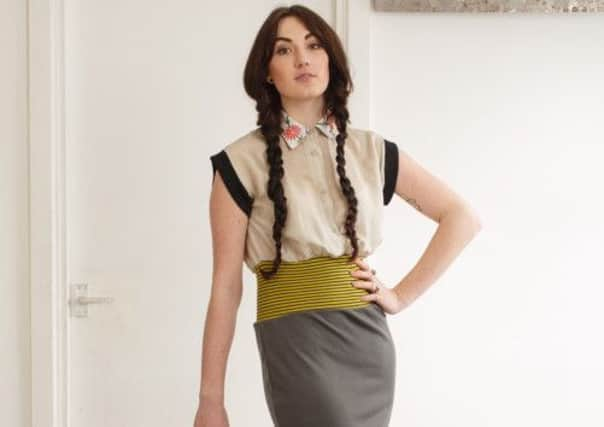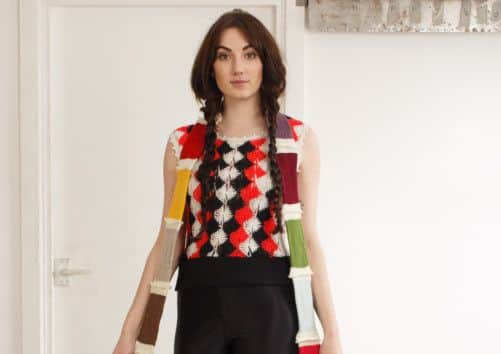Material benefits


Thanks to the vision, drive and commitment of a handful of passionate pioneers, ethical sustainable fashion is no longer on the margins of the industry.
A new generation is now taking up the challenge, building on what has already been achieved and taking the movement forward. In 2007 Lizzie Harrison, who had recently graduated from Leeds College of Art, started thinking about how she might make her own contribution. “I worked for a couple of years as a fashion designer production manager and I saw how much waste there was,” she says.
Advertisement
Hide AdAdvertisement
Hide Ad“The more I saw, the more I realised that the current model is very wasteful and not particularly respectful of the environment – and I thought to myself, ‘if I am going to work in fashion, I don’t want to be part of that model’. I wanted to try different approaches.”


Lizzie began looking into the possibility of using waste material to create new garments and reusing or “upcycling” old clothes. Her research led to a masters degree at the London College of Fashion and by the end of it she was ready to set up her own fashion company, Antiform, back in Leeds, in 2010. The company designs and manufactures clothes out of waste material – all sourced from within a radius of about 20 miles of their Hyde Park workshop.
“We use two categories of materials,” explains Lizzie. “Pre-consumer used material which is waste material that comes from local mills and factories and the other is post-consumer used material which is basically the stuff that charity shops can’t sell. We take textiles that are classed as waste and we make a quality garment out of it.”
Lizzie is in charge of the creative direction of the company and heads up a team of experienced local freelance designers and makers. She describes the Antiform style as “an eclectic mix of textures, fabrics and prints.” It is not unusual, she says, to find three of four combinations of different fabrics in one garment but above all the company wants to create clothes that are wearable and which endure.
Advertisement
Hide AdAdvertisement
Hide Ad“We have tried to slow down fashion cycles because the fast-paced disposable nature of today’s fashion breeds out longevity. We want to create pieces you want to buy because you love them and you want to keep on wearing them. You can repair things or have them repaired by one of our repair services.”
Antiform’s current spring/summer season has been inspired by the feminist Aymara wrestlers from Bolivia, with bright colour clash pieces created out of reclaimed cotton, linens and lurex. The resulting collection is bold, quirky and original – and quite unlike anything you are likely to find on the High Street. These are clothes to make the wearer stand out from the crowd. “We have to work within certain parameters,” says Lizzie. “We get the fabric first, whatever is available from our suppliers, and the style and design come next. We work with a regular number of mills and factories and then others on an ad hoc basis who ‘rescue’ fabric for us. I was recently contacted by someone who was disposing of cashmere samples, for example, and we made them into scarves. We have minimum sizing so that the garment is flexible. Most of our clothes are one size and the rest come in two sizes.”
Lizzie is passionate about the message that clothes should be made to last and the value of repairing, adapting and reusing clothes and fabrics; as a researcher she is looking at future possibilities for fashion on a local, national and global level. “We have to find a balance between consumption and resources. We have to start to understand that we can’t keep producing fashion that you buy one weekend and throw away the next.”
During the Second World War “make do and mend” was a way of life on the Home Front – women repaired and reused clothes, sheets, curtains and other household items.
Advertisement
Hide AdAdvertisement
Hide AdAs an ethical approach, this can be applied to today’s throwaway culture and Antiform, along with their partner organisation ReMade in Leeds, are working hard to encourage people to “avoid the landfill option.”
A not-for-profit social enterprise, ReMade in Leeds allows Lizzie and her team to try out different services and events to support people who are interested in sustainable fashion.
“We have been running a monthly clothes swap for the past five years,” she says. “You can bring up to twenty items and it costs £2. It has brought people together and last month a community group came forward to take over the clothes swap which they are going to run out of Woodhouse Community Centre.” They also work with schools and colleges, run a repair and alteration service and regularly organise upcycling workshops.
“Upcyling and restyling is something that everyone can do and it doesn’t cost a lot of money. It is really important to me that fashion becomes better for everybody not just people who can afford to buy ethically,” says Lizzie.
Advertisement
Hide AdAdvertisement
Hide Ad“This is responsible purchasing that is a bit more accessible to people on a lower income. People who come to the clothes swaps get styling advice and help with upcycling ideas – there is so much more soul to it than going to Primark.
“It’s in the ownership of the local community and it’s a business model that can be replicated.”
www.antiformonline.co.uk; www.remadeinleeds.org